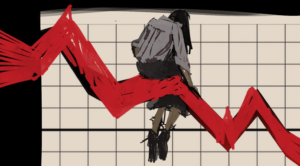On Dec. 4, Georgetown abdicated its core values. We hope the university will change its course.
Last month, Provost Robert Groves didn’t just refuse to recognize the Georgetown Alliance for Graduate Employees (GAGE) as a union representing Georgetown’s graduate workers; he also claimed that the people who teach some of Georgetown’s classes and do Georgetown’s research aren’t even workers. This is unacceptable.
Graduate workers have good reason to demand unionization. GAGE represents graduate students who work as teaching assistants, teaching associates, or research assistants. At most, these workers receive a $30,000 annual stipend, which is below MIT’s estimate of a living wage for a single D.C. adult. For many, this makes pursuing a degree difficult: “If it weren’t for years of savings and my wife working, there’s no way I––or any parent––could pursue a graduate degree at Georgetown,” one worker wrote. Worse, over a fifth of that income could disappear if a worker has a medical emergency. Under Georgetown’s health plan, graduate workers could pay up to $6,350 per year out-of-pocket. That’s five times higher than the out-of-pocket maximum at Northwestern. To undergraduates who may someday pursue graduate work: this could be you.
By refusing to recognize graduate students as workers, the university administration contradicted federal labor law, which explicitly states that graduate teaching and research assistants have the legal right to form a union.
Georgetown has also violated its own policies. The administration refused to consult with the Advisory Committee on Business Practices (ACBP), a working group composed of administrators, faculty, and undergraduate students charged with advising the administration on a variety of labor concerns, including whether or not a group has the right to organize. By cutting the ACBP out of the process, the administration removed the only student voices, those meant to represent the community as a whole, from the process. This move caused three students on the ACBP to rightfully resign in protest.
Most egregiously, however, the administration’s decision undermined the university’s Just Employment Policy (JEP). The JEP solidifies Georgetown’s commitment to supporting workers on campus and to remaining neutral during union negotiations. However, as Georgetown did not recognize graduate workers as workers, it determined that the JEP does not apply to teaching and research assistants. This leaves the door open for Georgetown to potentially intimidate graduate workers and interfere with union negotiations. In the worst case scenario, Georgetown could try to bring this case to Trump’s National Labor Relations Board, which could strip graduate workers across the country of the right to unionize.
Georgetown has also offered weak arguments to undermine that right. Some are non-arguments, like the statement that “GAGE only represents some graduate students.” Not all graduate students are workers—some simply take classes—and hence not all have a reason for belonging to a union.
Then there is the argument that a union would interfere with keeping down costs. Everybody wants to keep down costs. If the library wanted to buy books and could save money by buying them on sale, they would. But would anybody say it is okay for the school to pay less than what the books cost, and instead tell the book retailer that they should be grateful that Georgetown is giving them the opportunity to work as a book retailer? Would anybody say this is just? Replace “books” with “labor,” and one describes the GAGE decision.
Graduate labor is exactly that: labor. Graduate students may be learning on the job, but so are research assistants at entry-level jobs. Are they not workers? Moreover, how could the university function without graduate students to teach classes, grade papers, and do research? The work they perform is deeply valuable. It should be recognized as such.
However, there is reason for hope. On January 9th, Georgetown announced that it would be “seriously considering” allowing the American Arbitration Association to conduct an election in which graduate workers could vote on unionization. We urge Georgetown to respect the result of such an election and not to intimidate graduate workers during it. The university cannot drag its feet on issues of worker rights, as it did in tiptoeing around Nike’s issues with sweatshop labor and shortchanging its own hardworking facilities staff. Rather, it should build on the JEP, a guiding light in ethical labor policy. When it introduced the JEP, which increased wages and tolerated unionization, Georgetown demonstrated a willingness to put cura personalis, caring for the whole person, over minimizing costs. It must do so again.
Solidarity Shouts is a bi-weekly column, spearheaded by members of the Georgetown Solidarity Committee (GSC). GSC is a non-hierarchical, consensus-based organization that organizes around issues of labor in solidarity with workers on campus, in the D.C. region and around the world. GSC believes in the dignity of all work and workers, and stands against all forms of oppression and exploitation. General body meetings for GSC are every Monday at 9pm in White-Gravenor 202.
Even though members of GSC are coordinating this column, the perspectives shared do not necessarily represent the views of GSC as a whole. GSC simply sees the need for a leftist perspective on issues concerning campus, local, and international politics. In particular, this column will expand on the perspectives traditionally underrepresented in the mainstream left, informed by critiques of capitalism, imperialism, racism, sexism, and other exploitative systems. Solidarity Shouts appears online every other Friday.






